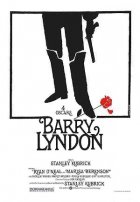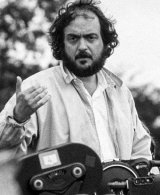
Barry Lyndon Page #12
- PG
- Year:
- 1975
- 185 min
- 1,209 Views
MINISTER GALGENSTEIN
Does this assignment interest you?
RODERICK:
Yes, Minister, I am interested in
any work in which I can be of
service to Captain Galgenstein.
The Minister studies Roderick, coldly.
EXT. CHEVALIER DE BELLE FAST'S HOUSE - BERLIN - DAY
Roderick, now dressed in civilian clothes, admires a
beautiful carriage, waiting at the door. Then he enters.
INT. CHEVALIER DE BELLE FAST'S APARTMENT - DAY
CHEVALIER:
You are the young man who M. de
Seebach recommended?
RODERICK:
Yes, sir. Here is my letter.
Roderick bows, and hands him a letter from that gentleman,
with which the Captain had taken care to provide him.
As the Chevalier reads the letter, Roderick has the
leisure to examine him.
He is a man of sixty years of age, dressed superbly,
wearing rings, diamonds and laces.
One of his eyes is closed with a black patch, and he wears
a little white and red paint, and a pair of moustachios,
which fall over his lip.
The Chevalier is seated at a table near the window to read
the letter.
CHEVALIER:
Your name is Lazlo Zilagyi?
RODERICK:
Yes, sir.
CHEVALIER:
You come highly recommended by Herr
Seebach.
RODERICK:
Herr Seebach was a very kind
employer.
CHEVALIER:
For whom else have you worked?
RODERICK:
No one, sir. Before that I served
in the army but had to leave due to
weakness of the loins.
CHEVALIER:
Who else can give me information
about you?
RODERICK:
Only the agency of servants.
The Chevalier puts the letter down, looks at Roderick for
a few seconds, and then smiles.
CHEVALIER:
You will do. I will give you 30...
a day. I do not provide your
clothing; you will sleep at home,
and you will be at my orders every
morning at seven o'clock.
He notices Roderick begin to tremble and look peculiar.
CHEVALIER:
Is there something wrong?
He goes up to Roderick.
RODERICK (V.O.)
It was very imprudent of me; but
when I saw the splendor of his
appearance, the nobleness of his
manner, I felt it impossible to keep
disguise with him. You, who have
never been out of your country know
little what it is to hear a friendly
voice in captivity; and there's a
many a man that will understand the
cause of the burst of feeling which
was about to take place.
The Chevalier takes Roderick by the shoulder.
RODERICK:
(as he speaks,
bursting into tears)
Sir, I have a confession to make. I
am an Irishman, and my name is
Roderick James. I was abducted into
the Prussian army two years ago, and
now I have been put into your
service by my Captain and his uncle,
the Minister of Police, to serve as
a watch upon your actions, of which
I am to give information to the same
quarter. For this odious service, I
have been promised my discharge, and
a hundred guineas.
Sobbing, Roderick falls into his arms.
CHEVALIER:
The rascals! They think to catch
me, do they? Why, young man, my
chief conspiracy is a faro-bank.
But the king is so jealous, that he
will see a spy in every person who
comes to his miserable capital, in
Roderick and the Chevalier walking.
RODERICK (V.O.)
And I think he was as much affected
as I was at thus finding one of his
kindred; for he, too, was an exile
from home, and a friendly voice, a
look, brought the old country back
to his memory again, and the old
days of his boyhood.
CHEVALIER:
I'd give five years of my life to
see the old country again, the
greenfields, and the river, and the
old round tower, and the burying
place.
Roderick and the Chevalier walking.
CHEVALIER:
My lad, I have been in every
service; and, between ourselves, owe
money in every capital in Europe. I
have been a rolling stone. Play --
play has been my ruin! That and
beauty. The women have made a fool
of me, my dear boy. I am a soft-
hearted creature, and this minute,
at sixty-two, have no more command
of myself than when Peggy O'Dwyer
made a fool of me at sixteen.
EXT. BERLIN - LAKE WANNSEE - DAY
Roderick and the Chevalier walking along the bank.
CHEVALIER:
The cards are now my only
livelihood. Sometimes I am in luck,
and then I lay out my money in these
trinkets you see. It's property,
look you, and the only way I have
found of keeping a little about me.
When the luck goes against me, why,
my dear, my diamonds go to the
pawnbrokers and I wear paste. Do
you understand the cards?
RODERICK:
I can play as soldiers do, but have
no great skill.
CHEVALIER:
We will practice in the mornings, my
boy, and I'll put you up to a thing
or two worth knowing.
INT. CHEVALIER'S ROOMS - BERLIN - DAY
Quick cuts -- Roderick being taught the profession of
cards and the dice-box.
EXT. GARDEN HOUSE - BERLIN - DAY
Roderick, Minister Galgenstein, and Captain Galgenstein.
RODERICK (V.O.)
I carried my little reports to
Captain Galgenstein at the Garden
house outside the town where he gave
me rendezvous. These reports, of
course, were arranged between me and
the Chevalier beforehand. I was
instructed, and it is always the
best way, to tell as much truth as
Dialogue comes up from under voice over.
RODERICK:
He goes to church regularly -- he is
very religious, and after hearing
mass comes home to breakfast. Then
he takes an airing in his chariot
till dinner, which is served at
noon. After dinner, he writes his
letters, if he has any letters to
write; but he has very little to do
in this way. His letters are to the
Austrian envoy, with whom he
corresponds, but who does not
acknowledge him; and being written
in English, or course, I look over
his shoulder. He generally writes
for money. He makes his party with
Calsabigi, the lottery contractor,
the Russian attaches, two from the
English embassy, my lords Deuceace
and Punter, who play a jeu d'enfer,
and a few more. He wins often, but
not always. Lord Deuceace is a very
fine player. The Chevalier Elliott,
the English Minister, sometimes
comes, on which occasion the
secretaries do not play.
INT. CHEVALIER'S APARTMENTS - NIGHT
The Chevalier is at play against several gentlemen,
including the Prince of Turbingen, while Roderick signals
the cards.
RODERICK (V.O.)
It was agreed that I should keep my
character of valet, that in the
presence of strangers I should not
know a word of English, that I
should keep good lookout on the
trumps when I was serving the
champagne and punch about; and,
having a remarkably fine eyesight,
and a great natural aptitude, I was
speedily able to give my dear
benefactor much assistance against
his opponents at the green table.
Several cuts of playing and cheating to illustrate voice
over.
RODERICK (V.O.)
Simplicity was our secret.
Everything successful is simple.
If, for instance, I wiped the dust
off a chair with my napkin, it was
to show that the enemy was strong in
diamonds; if I pushed it, he had an
ace, king; if I said, "Punch or
wine, my lord?" hearts was meant.
If "Wine or punch?" clubs. If I
blew my nose, it was to indicate
that there was another confederate
employed by the adversary; and then,
I warrant you, some pretty trials of
skill would take place. The Prince
of Turbingen, although so young, had
a very great skill and cleverness
with the cards in every way; and it
was only from hearing Ritter von
Brandenburg, who came with him, yawn
three times when the Chevalier had
the ace of trumps, that I knew we
were Greek to Greek, as it were.
Translation
Translate and read this script in other languages:
Select another language:
- - Select -
- 简体中文 (Chinese - Simplified)
- 繁體中文 (Chinese - Traditional)
- Español (Spanish)
- Esperanto (Esperanto)
- 日本語 (Japanese)
- Português (Portuguese)
- Deutsch (German)
- العربية (Arabic)
- Français (French)
- Русский (Russian)
- ಕನ್ನಡ (Kannada)
- 한국어 (Korean)
- עברית (Hebrew)
- Gaeilge (Irish)
- Українська (Ukrainian)
- اردو (Urdu)
- Magyar (Hungarian)
- मानक हिन्दी (Hindi)
- Indonesia (Indonesian)
- Italiano (Italian)
- தமிழ் (Tamil)
- Türkçe (Turkish)
- తెలుగు (Telugu)
- ภาษาไทย (Thai)
- Tiếng Việt (Vietnamese)
- Čeština (Czech)
- Polski (Polish)
- Bahasa Indonesia (Indonesian)
- Românește (Romanian)
- Nederlands (Dutch)
- Ελληνικά (Greek)
- Latinum (Latin)
- Svenska (Swedish)
- Dansk (Danish)
- Suomi (Finnish)
- فارسی (Persian)
- ייִדיש (Yiddish)
- հայերեն (Armenian)
- Norsk (Norwegian)
- English (English)
Citation
Use the citation below to add this screenplay to your bibliography:
Style:MLAChicagoAPA
"Barry Lyndon" Scripts.com. STANDS4 LLC, 2025. Web. 24 Feb. 2025. <https://www.scripts.com/script/barry_lyndon_1068>.







Discuss this script with the community:
Report Comment
We're doing our best to make sure our content is useful, accurate and safe.
If by any chance you spot an inappropriate comment while navigating through our website please use this form to let us know, and we'll take care of it shortly.
Attachment
You need to be logged in to favorite.
Log In